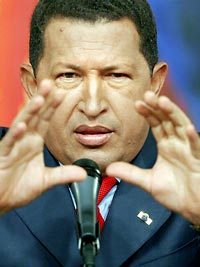When chased by Latin America's playground bully, Bush runs, hides

Fans of author J.K. Rowling's Harry Potter series know of the Dark Lord, "He-Who-Must-Not-Be-Named." That villainous wizard goes by the name Voldemort, not Hugo Chávez.
Throughout his hemispheric tour de farce, Bush II ignored Chávez, who chased him like the Dark Lord. Our fearless leader should have confronted the Venezuelan because, where Chávez is concerned, George W. Bush has more redeeming qualities.
The fictional Voldemort is described as "tall and skeletally thin" with a face "whiter than a skull, with wide, livid scarlet eyes whose pupils were slit like a cat's." Chávez resembles a toad, but not the cuddly kind that was Frida Kahlo's beloved Diego Rivera. Chávez is a pock-marked toad whose body bloats from bombast and bile. He flicked his massive tongue and extracted democratic hopes from his people.
When the thin-skinned dictator angers, his eyes bulge. He fears the free press, so he censors newspapers and shuts down TV stations. Bush fears the press, too, but at least the Constitution keeps him in check. So what was our fearless leader afraid of when he avoided Chávez? Warts?
Everybody knows that Chávez is the bully of the South American playground. What do you do with a bully, boys and girls? You stand up to him. You might lose the fight, but at least you'll win respect.
As someone who has written about Latin America since the 1980s and who has traveled extensively there, I know the importance of machismo. I also know a caudillo when I see one. Dictator Chávez presents a limp interpretation of machismo. However, Bush didn't display anything on his five-nation tour but a Texas-sized appetite.
Instead of confronting Chávez indirectly through reporters, Bush pretended that he wasn't there. He was like the little boy afraid of monsters under his bed. Like a little girl chased by nightmares. As Americans, we aren't used to pitying our presidents or wishing we could fight their battles for them. Does "last remaining superpower" ring a bell?
Where's the guy who said of bin Laden, "You can run, but you can't hide"? Who said, "Let's roll," and "Bring it on"? Who recently told Americans to have "courage and resolve" and resist Democratic challenges to his war policy? Courage? Bush can spell it, but can't project it.
The Great Communicator, Ronald Reagan, would have answered Chávez's taunts of "Iraq, Iraq, Iraq, Iraq" with a clever quip. Now there was a macho, macho man! Maybe too macho, considering his flawed Latin American policies. But remember, "Mr. Gorbachev, tear down this wall?" Even soft-spoken Jimmy Carter carried a big stick to broker the Camp David Accords.
Sure, Chávez can draw a crowd at stadiums in countries where he appears. But so does Michael Jackson. Never confuse celebrity with respectability.
Chávez's power comes from his dictatorial prowess, limits on free speech and the short leash on which he keeps his enemies and use of petrodollars like a personal stash.
Those who follow Chávez do so out of fear. Plus, the anti-Yankee rhetoric plays well in parts of the region. But Bush hasn't taken his imperial presidency into Latin America; it is aimed at Iraq and Iran.
While Bush turned U.S. policies rightward, Latin America turned leftward. Such opportunists as Chávez take advantage of the administration's neglect. Human rights in Latin America are deteriorating. There's a reason Chávez won't cooperate with the Organization of American States' Human Rights Commission. He threw stones at Bush from a glass house in Caracas.
The United States must engage oil-rich Venezuela, even if it means dealing with this Castro impersonator. Cuba's ailing "Maximum Leader" is a legend. Chávez is a legend in his own mind.
Unfortunately, he has found America's weakest spot: our leader. But that doesn't mean he is the better man.
Sticks and stones may break our bones, but Hugo Chávez will never hurt us.
Rhonda Chriss Lokeman is a columnist for the Kansas City Star. E-mail her at lokeman@kcstar.com